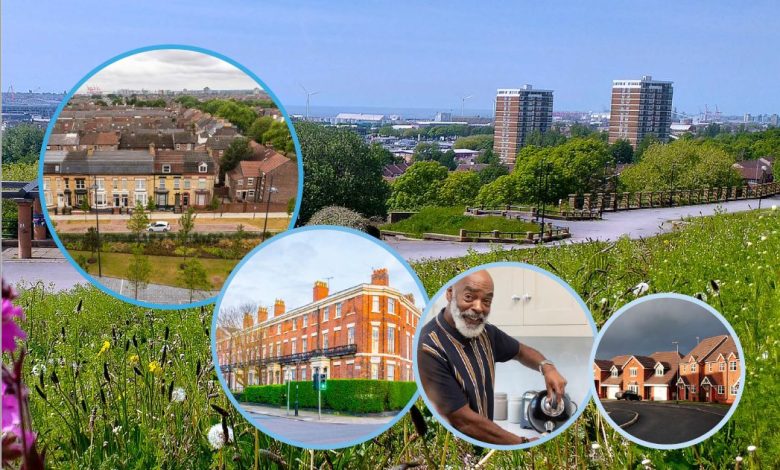Liverpool City Council launches consultation on housing vision to 2030

Liverpool City Council has (Wednesday, 10 July) launched a public consultation on the city’s housing plans.
The Council has set out a vision to 2030 with a commitment to support 2,000 new homes a year, reduce the number of empty properties and tackle homelessness in its new draft housing strategy, which once implemented will shape a £1-billion-plus building programme.
In line with the aims of the new Government, the Council has also set out a commitment to develop brownfield sites and is currently working on schemes including: Festival Gardens, Liverpool Waters, King’s Dock and Paddington Village.
Liverpool is forecasted to grow by 40,000 households in the next 20 years, and the Council intends to use the strategy to address the fact that 52 per cent of people in the city currently live in either private rented – or social rented homes – one of the highest ratios in the country.
The Council has also made a commitment to double the number of affordable homes to ensure the housing market works for first-time buyers. Of the 10,700 new homes built in the past five years, just 11 per cent are classed as affordable homes.
The draft housing strategy consultation runs until Friday, 6 September and features an online survey, which is available at: liverpool.gov.uk/housingstrategyconsultation. People can also email feedback to: housing.strategy@liverpool.gov.uk
There will also be three community feedback days where residents can come and talk to community researchers and officers about the strategy and get assistance in completing the survey:
- Central Library: 9am-6pm, Wednesday, 7 August
- Spellow Library: 10am-6pm, Monday, 12 August
- Garston Library: 9am-4.30pm, Tuesday, 13 August
In addition, the Council’s consultants on the draft strategy, Campbell Tickell, will host focus groups to target communities who are typically underrepresented in resident surveys.
There will also be a workshop for the Council’s Registered Provider Partners and a webinar for providers in the private rented sector.
The draft housing strategy, which highlights that 20 per cent (44,000) of properties in the city do not meet the “decent homes” definition, will be underpinned by four key themes designed to improve people’s health and support the Council’s net-zero ambitions:
- Delivering quality homes that support needs and aspirations
Key aim: enabling partners to build at least 8,000 new homes by 2027 and 20 per cent affordable housing. - Improving homes and neighbourhoods
Key aim: improve quality of rented homes and bring empty homes back into use. - Promoting healthier lives and sustainable homes
Key aim: retrofit homes, prioritising those on low incomes in the worst-rated properties. - Enabling access to a suitable home
Key aim: tackle homelessness and rough sleeping by providing more housing for vulnerable groups and those with support needs. This will be underpinned by a new homelessness strategy which is currently being devised.
Housing is recognised as one of the key factors affecting people’s health and wellbeing and the Council has set out to address the issue in both its Council Plan, which was agreed in 2023, and the recent State of Health in the City: Liverpool 2040 report.
Another key focus of the draft strategy is to set out a major retrofitting programme to improve insulation and heating sustainability standards as new data shows 18 per cent of households are living in fuel poverty. The programme would also reduce the carbon footprint of the city’s housing stock, which currently accounts for 33 per cent of the city’s carbon emissions.
The Council has announced it is to carry out a review of empty homes in the city to support a drive to tackle a shortfall in housing, by writing to landlords of more than 8,000 empty properties.
WHAT HAPPENS NEXT?:
Following the public consultation, the Council will develop a detailed action plan for the housing strategy, with specific Key Performance Indicators to be monitored and measured.
The final Liverpool Housing Strategy is scheduled to be approved by Cabinet in autumn 2024.
This strategy will also inform the new Local Plan, which the Council is currently working on to replace the 2022 Local Plan. It will provide the statutory planning policy framework for the growth and regeneration of the city and will be underpinned by a Strategic Housing Market Needs Assessment.
Based on an extensive evidence base it will include policies and land use allocations in respect of matters such as housing, the economy, open space, heritage, design and climate change. The Council intends to submit the plan to Government for independent examination in late 2025 and to adopt it by December 2026.
Councillor Liam Robinson, Leader of Liverpool City Council, said:
“The new Government has set out its mission to change the housing landscape of this country – and Liverpool stands ready to play its part.
“The Council recognises the challenges people face to get on the property ladder, which is why our new draft housing strategy has set out a target for 2,000 new homes a year, with a fifth being affordable.
“The underlying problem of supply and demand is also at the heart of our mission – which is why we are working with a range of partners to unlock key brownfield sites and to systematically reduce the number of empty properties.
“Together this will help kickstart a £1 billion boom in housebuilding across the city, which will have a huge impact on our economy and workforce.
“Housing is the foundation for building a better quality of life which is why we want to focus on retrofitting poorly insulated homes to help reduce mould and energy bills and at the same time improve our carbon footpint.
“Good quality, suitable housing is also a major contributor to ensuing people access the services they need and helps the Council better address the needs of our most vulnerable residents.
“This draft strategy outlines our ambitions for improving Liverpool’s housing offer as well as helping to reduce homelessness.
“Achieving these ambitions will be reliant on the Council securing strong support from residents and stakeholders for this vision. Delivering the plan will also require intelligent collaboration with our partners, including the Combined Authority, Government and its agencies, developers, investors and housing providers.
“I’m confident Liverpool can get the country moving in launching a new era of quality, affordable homes.”






